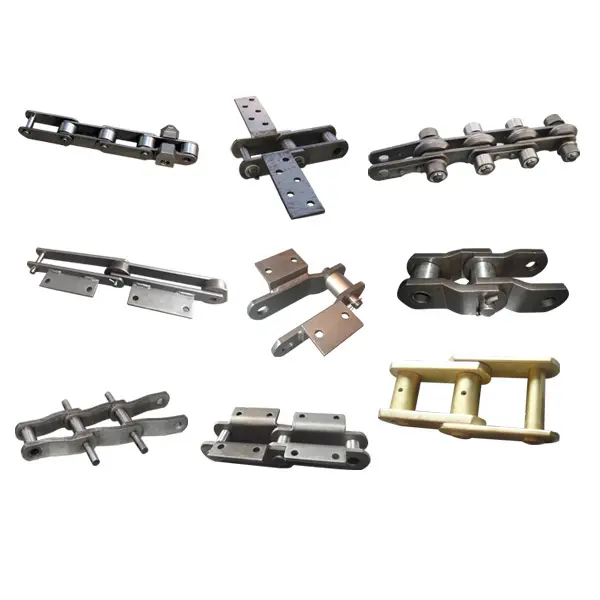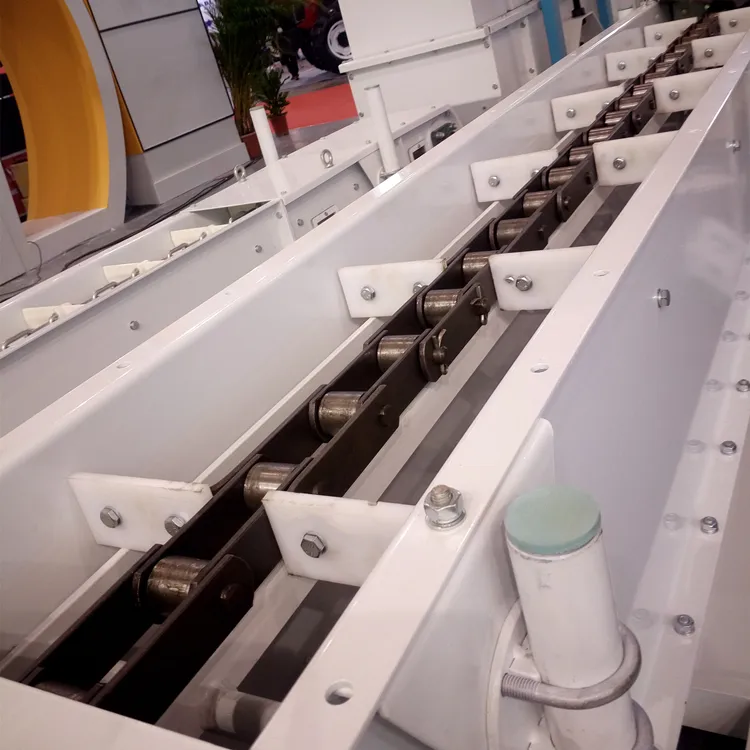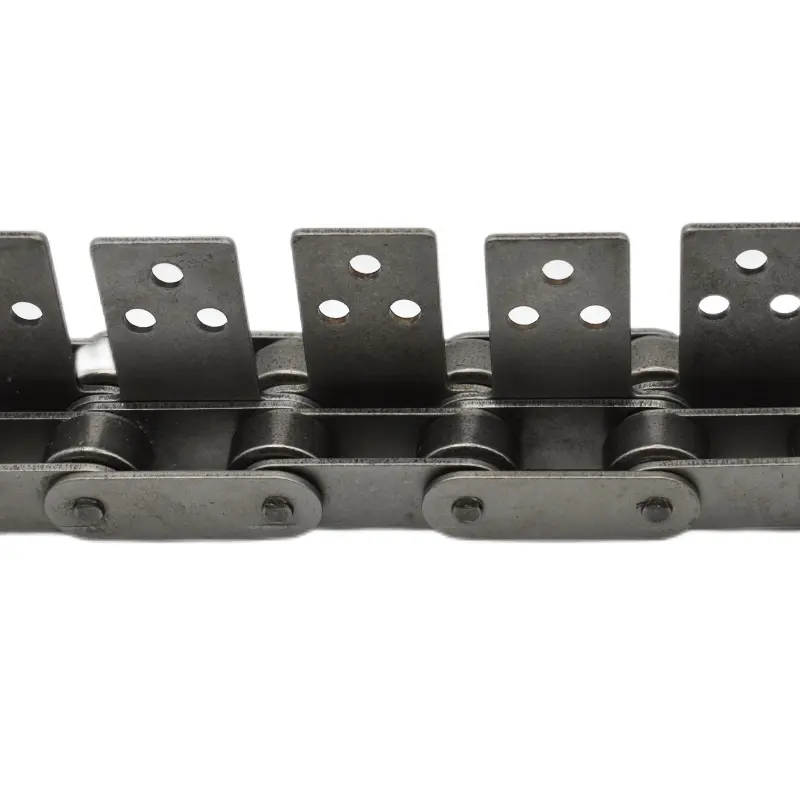Product Description
Simplex stainless 304 Roller Chain (08B-1, 24B-1)
The most commonly used chain is roller chain or as it is also known transmission chain. These are the simplest chain drives, Used mainly for transmitting power. Can be supplied from 3mm pitch up to 4″ pitch in either mild steel or stainless steel.
| DIN/ISO Chain No. |
Pitch | Roller Diameter |
Width Between Inner Plates |
Pin Diameter |
Pin Length |
Inner Plate depth |
Plate thick ness |
Ultimate Tensile Strength |
Average Tensile Strength |
Weight Per Meter |
|
| Mm | mm | mm | mm | mm | mm | mm | mm | kN/LB | kN | Kg/m | |
| 04B-1 | 6.000 | 4.00 | 2.80 | 1.85 | 6.80 | 7.80 | 5.00 | 0.60 | 3.0/682 | 3.2 | 0.11 |
| 05B-1 | 8.000 | 5.00 | 3.00 | 2.31 | 8.20 | 8.90 | 7.10 | 0.80 | 5.0/1136 | 5.9 | 0.20 |
| *06B-1 | 9.525 | 6.35 | 5.72 | 3.28 | 13.15 | 14.10 | 8.20 | 1.30 | 9.0/2045 | 10.4 | 0.41 |
| 08B-1 | 12.700 | 8.51 | 7.75 | 4.45 | 16.70 | 18.20 | 11.80 | 1.60 | 18.0/4091 | 19.40 | 0.69 |
| 10B-1 | 15.875 | 10.16 | 9.65 | 5.09 | 19.50 | 20.90 | 14.70 | 1.70 | 22.4/5091 | 27.50 | 0.93 |
| 12B-1 | 19.050 | 12.07 | 11.68 | 5.72 | 22.50 | 24.2 | 16.00 | 1.85 | 29.0/6591 | 32.20 | 1.15 |
| 16B-1 | 25.400 | 15.88 | 17.02 | 8.28 | 36.10 | 37.4 | 21.00 | 4.15/3.1 | 60.0/13636 | 72.80 | 2.71 |
| 20B-1 | 31.750 | 19.05 | 19.56 | 10.19 | 41.30 | 45.0 | 26.40 | 4.5/3.5 | 95.0/21591 | 106.7 | 3.70 |
| 24B-1 | 38.100 | 25.40 | 25.40 | 14.63 | 53.40 | 57.80 | 33.20 | 6.0/4.8 | 160.0/36364 | 178.0 | 7.10 |
| 28B-1 | 44.450 | 27.94 | 30.99 | 15.90 | 65.10 | 69.50 | 36.70 | 7.5/6.0 | 200.0/45455 | 222.0 | 8.50 |
| 32B-1 | 50.800 | 29.21 | 30.99 | 17.81 | 66.00 | 71.0 | 42.00 | 7.0/6.0 | 250.0/56818 | 277.5 | 10.25 |
| 40B-1 | 63.50 | 39.37 | 38.10 | 22.89 | 82.20 | 89.2 | 52.96 | 8.5/8.0 | 355.0/80682 | 394.0 | 16.35 |
| 48B-1 | 76.20 | 48.26 | 45.72 | 29.24 | 99.10 | 107.0 | 63.80 | 12.0/10.0 | 560.0/127272 | 621.6 | 25.00 |
| 56B-1 | 88.90 | 53.98 | 53.34 | 34.32 | 114.60 | 123.0 | 77.80 | 13.5/12.0 | 850.0/193180 | 940.0 | 35.78 |
| *Bushing chain: d1 in the table indicate the external diameter of bushing |
|||||||||||
We own the sophisticated equipment and the advanced technology, such as:
1. CAD Designer
2. Wire Cutting Machine
3. Chain Running In Machine
4. Conveyor Furance
5. Ball Drift
6. Shot Peened Parts
7. Design Of Link Plate Waist
Company Detail:
GOODLUCK TRANSMISSION is 1 of a professional exporter with exporting POWER TRANSMISSION PARTS: Roller chains,conveyor chain,stainless steel chains, agricultural chains, steel detachable chains, special chains, sprockets, s. S. Sprockets, HRC couplings, pulleys, bushes etc. All these products have been supplied regularly to World Wide for over 15 years.
Welcome contact for more detail.
/* January 22, 2571 19:08:37 */!function(){function s(e,r){var a,o={};try{e&&e.split(“,”).forEach(function(e,t){e&&(a=e.match(/(.*?):(.*)$/))&&1
| Usage: | Transmission Chain |
|---|---|
| Material: | Stainless steel |
| Surface Treatment: | Polishing |
| Samples: |
US$ 100/Piece
1 Piece(Min.Order) | Order Sample Pls contact with Sellers
|
|---|
| Customization: |
Available
| Customized Request |
|---|
.shipping-cost-tm .tm-status-off{background: none;padding:0;color: #1470cc}
|
Shipping Cost:
Estimated freight per unit. |
about shipping cost and estimated delivery time. |
|---|
| Payment Method: |
|
|---|---|
|
Initial Payment Full Payment |
| Currency: | US$ |
|---|
| Return&refunds: | You can apply for a refund up to 30 days after receipt of the products. |
|---|
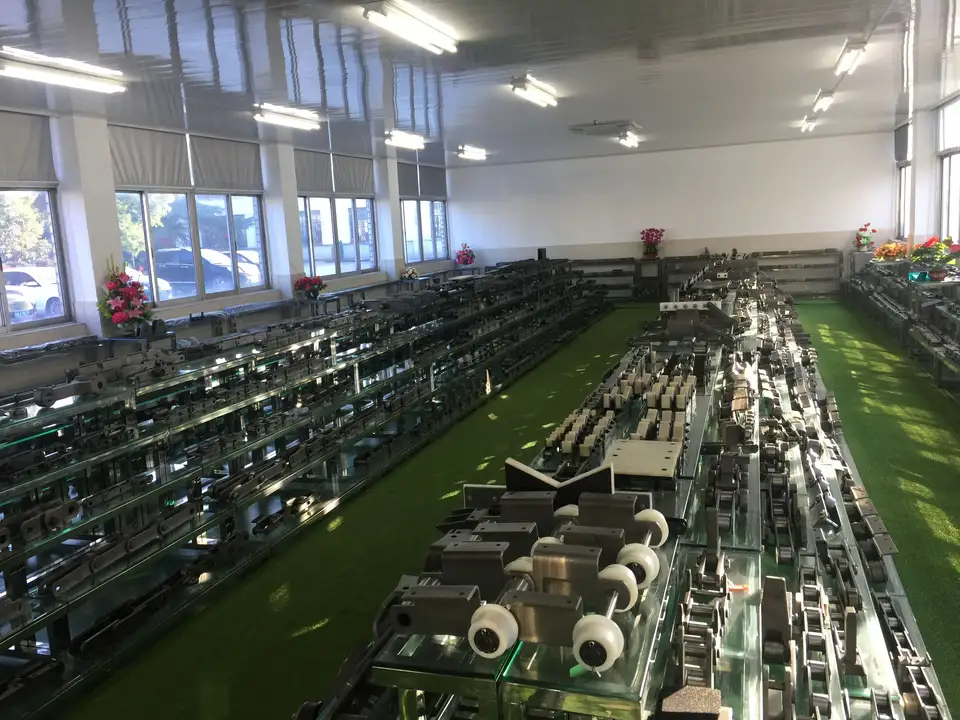
How do agricultural chains handle the challenges of uneven terrain?
Agricultural chains are designed to handle the challenges of uneven terrain commonly encountered in farming and agricultural operations. These chains possess certain characteristics that enable them to navigate and function effectively on rough and undulating surfaces. Here’s how agricultural chains address the challenges of uneven terrain:
- Flexibility: Agricultural chains are built with flexibility in mind. This allows them to adjust and adapt to the varying contours of the terrain, ensuring continuous contact with the sprockets and smooth operation even on bumpy ground.
- High Tensile Strength: To handle uneven terrain, agricultural chains are constructed from high-quality materials with excellent tensile strength. This enhances their ability to withstand stress and load variations while traveling over rough surfaces.
- Self-Cleaning Design: Many agricultural chains feature a self-cleaning design that helps prevent the buildup of mud, debris, and crop residues between the chain links and sprockets. This reduces the risk of chain slippage and ensures reliable performance on uneven ground.
- Corrosion Resistance: Some agricultural chains are equipped with corrosion-resistant coatings or materials, which protect the chains from rust and degradation caused by exposure to moisture and harsh outdoor conditions.
- Sturdy Construction: Agricultural chains are manufactured with durable components and robust construction to withstand the rigors of demanding agricultural environments. This includes uneven terrain, heavy loads, and frequent start-stop cycles.
By addressing these challenges, agricultural chains provide smooth and efficient power transmission between different agricultural machinery components, enabling farmers to effectively work on various types of terrain. Whether it’s plowing, seeding, harvesting, or transporting, the adaptability and strength of agricultural chains play a critical role in optimizing farming operations on uneven ground.
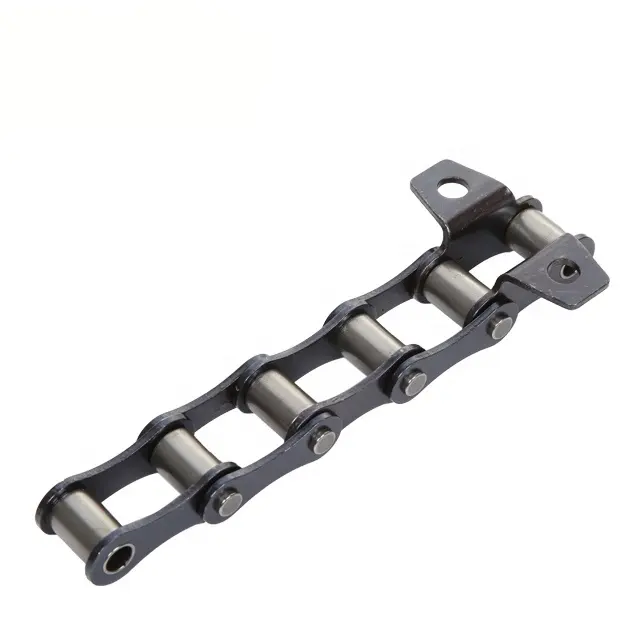
What are the benefits of using high-quality agricultural chains in farming machinery?
High-quality agricultural chains play a crucial role in the efficiency, productivity, and overall performance of farming machinery. Here are some key benefits of using high-quality agricultural chains:
- Reliability and Durability: High-quality chains are built to withstand the demanding conditions of agricultural operations, such as exposure to dirt, debris, and varying weather conditions. They have excellent resistance to wear, fatigue, and corrosion, ensuring a longer service life and reduced downtime.
- Increased Efficiency: Agricultural chains with precise manufacturing and tight tolerances reduce friction and power loss, leading to improved energy efficiency in farming machinery. This efficiency translates to better fuel economy and lower operational costs.
- Optimal Performance: Using high-quality chains ensures smooth and consistent power transmission, which is critical for the proper functioning of various farming equipment, such as harvesters, tractors, and planters. It helps maintain constant speed and power delivery, leading to higher productivity and better crop yields.
- Enhanced Safety: Reliable chains reduce the risk of unexpected failures or breakdowns during operation, minimizing the chances of accidents and injuries to operators and bystanders. High-quality chains are designed to meet industry safety standards and provide a higher level of assurance during use.
- Lower Maintenance Costs: High-quality chains require less frequent maintenance and replacement, resulting in reduced maintenance costs and downtime. Investing in durable chains upfront can lead to substantial savings in the long run.
- Compatibility and Versatility: Well-manufactured agricultural chains are designed to fit precisely with the sprockets and other components of farming machinery. They are available in various sizes and configurations, making them compatible with a wide range of equipment and applications.
Overall, choosing high-quality agricultural chains for farming machinery ensures reliable and efficient performance, maximizes the return on investment, and contributes to a smoother and more productive farming operation.
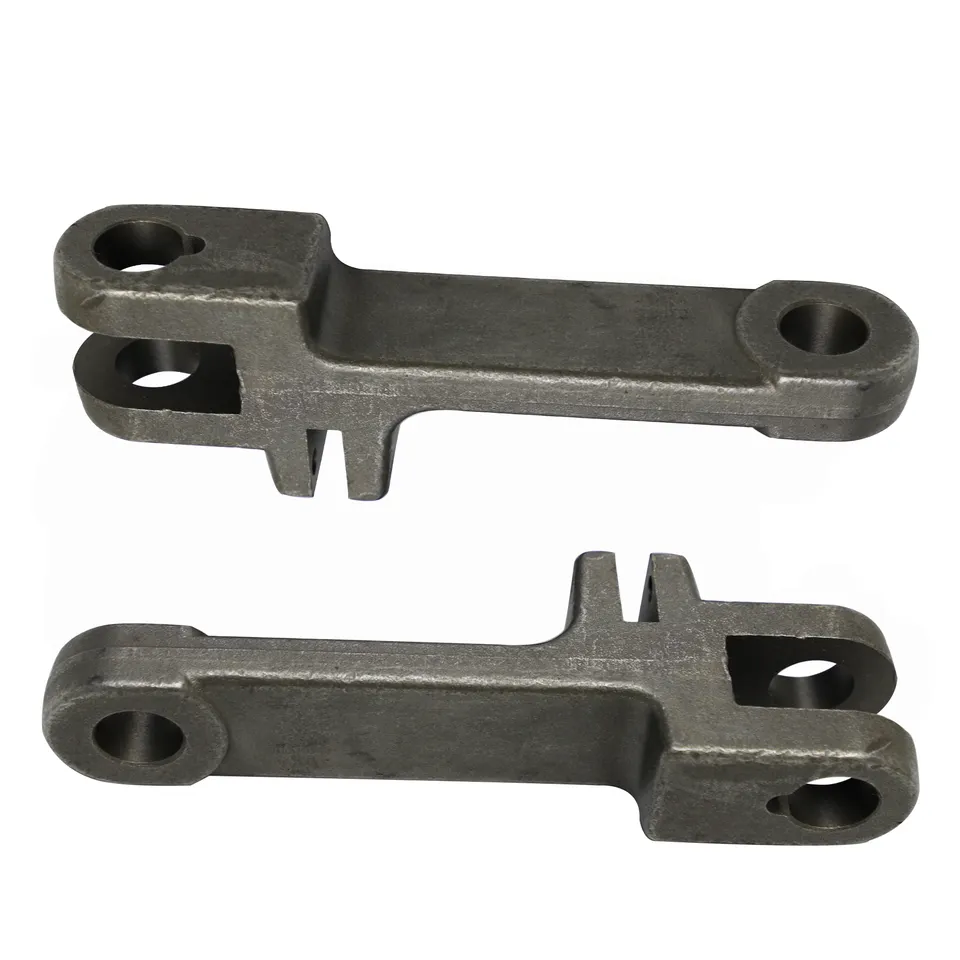
What materials are commonly used in manufacturing agricultural chains?
Agricultural chains are manufactured using various materials, each offering specific characteristics suitable for different farming applications. The most commonly used materials include:
- Carbon Steel: Carbon steel is a widely used material for agricultural chains due to its excellent strength, durability, and affordability. It is suitable for general-purpose chains used in many agricultural applications.
- Alloy Steel: Alloy steel chains are made by adding alloying elements to carbon steel, enhancing their strength and toughness. These chains are ideal for heavy-duty applications that require increased load-bearing capacity.
- Stainless Steel: Stainless steel chains are corrosion-resistant and maintain their strength and appearance even in harsh environments. They are commonly used in applications where resistance to rust and chemicals is essential, such as in poultry and food processing equipment.
- Plastic and Polymer: Some agricultural chains are made of plastic or polymer materials, which offer benefits like low friction, lightweight, and corrosion resistance. They are used in applications where noise reduction and low maintenance are priorities.
- Galvanized Steel: Galvanized chains are coated with a layer of zinc, providing additional protection against corrosion. They are suitable for outdoor applications exposed to moisture and agricultural chemicals.
The choice of material depends on factors such as the specific agricultural application, the operating environment, required strength, and budget considerations. Manufacturers select the appropriate material to ensure that the agricultural chains can withstand the demanding conditions of farming operations and contribute to the overall efficiency and productivity of the equipment.


editor by CX 2024-05-13
China manufacturer Industrial Mill Steel Welded Lumber Cast Iron Conveyor Chain Attachment Roller Chain Drag Chains Customized
Product Description
WH82 Welded Steel Chain ( For Steel Factory)
We own the sophisticated equipment and the advanced technology, such as:
1. CAD Designer
2. Wire Cutting Machine
3. Chain Running In Machine
4. Conveyor Furance
5. Ball Drift
6. Shot Peened Parts
7. Design Of Link Plate Waist
We have different models of welding chains, such as:
| Chain No
|
Pitch
(mm) |
Outside Barrel Dia
(mm) |
Pin Dia
(mm) |
Side Bar Height
(mm) |
Approx Tooth Face at pitch line
(mm) |
Length of Bearing
(mm) |
Plate Thickness
(mm) |
Ultimate tensile strength
(KN) |
Weight Approx
(Kg/FT) |
|
| WH82 | 78.1 | 26.97 | 14.35 | 31.8 | 38.1 | 57.4 | 6.4 | 132 | 2.28 |
|
We own the sophisticated equipment and the advanced technology, such as:
1. CAD Designer
2. Wire Cutting Machine
3. Chain Running In Machine
4. Conveyor Furance
5. Ball Drift
6. Shot Peened Parts
7. Design Of Link Plate Waist
Company Detail:
GOODUCK(TAI) is 1 of a professional exporter with exporting POWER TRANSMISSION PARTS: Roller chains,Conveyor chains,Stainless steel Chains, agricultural chains, steel detachable chains, special chains, sprockets, s. S. Sprockets, HRC couplings, pulleys, bushes etc. All these products have been supplied regularly to World Wide for over 15 years.
Welcome contact for more details.
Sofia Chen(Sales Manager)
HangZhou GOODLUCK TRANSMISSION TECHNOLOGY CO.,LTD
/* January 22, 2571 19:08:37 */!function(){function s(e,r){var a,o={};try{e&&e.split(“,”).forEach(function(e,t){e&&(a=e.match(/(.*?):(.*)$/))&&1
| Material: | Steel |
|---|---|
| Structure: | Welded Chain |
| Surface Treatment: | Polishing |
| Customization: |
Available
| Customized Request |
|---|
.shipping-cost-tm .tm-status-off{background: none;padding:0;color: #1470cc}
|
Shipping Cost:
Estimated freight per unit. |
about shipping cost and estimated delivery time. |
|---|
| Payment Method: |
|
|---|---|
|
Initial Payment Full Payment |
| Currency: | US$ |
|---|
| Return&refunds: | You can apply for a refund up to 30 days after receipt of the products. |
|---|


What are the benefits of using a cast chain in pulp and paper manufacturing?
In the pulp and paper manufacturing industry, cast chains offer several benefits that make them well-suited for various applications within the production process. Pulp and paper mills involve handling heavy loads, abrasive materials, and continuous operations, and cast chains excel in meeting these challenges. Here are some of the key advantages of using cast chains in pulp and paper manufacturing:
- Strength and Durability: Cast chains are designed to handle heavy loads and provide high tensile strength, making them ideal for conveying large amounts of raw materials and finished paper products throughout the manufacturing process.
- Resistance to Abrasion: The materials used in cast chains, such as heat-treated alloy steel, offer excellent resistance to abrasive materials found in the wood processing and papermaking operations.
- Reliability: Pulp and paper mills operate continuously to maintain productivity. Cast chains provide reliable and consistent performance, reducing the risk of unexpected downtime.
- Customization: Cast chains can be tailored to fit specific equipment and applications within the pulp and paper manufacturing process, ensuring optimal functionality and efficiency.
- Long Service Life: Cast chains have a longer operational life compared to some other chain types, resulting in reduced maintenance and replacement costs over time.
- Reduced Maintenance: With their robust construction, cast chains require less frequent maintenance, making them suitable for demanding industrial settings.
In pulp and paper manufacturing, cast chains are commonly used in various applications, including log conveying, chip handling, debarking, pulping, washing, and paper machine sections. Their ability to withstand the harsh operating conditions and efficiently handle heavy loads makes them a reliable choice for the industry.
It’s important to ensure proper lubrication and regular inspection of cast chains to maintain their performance and extend their service life in the challenging pulp and paper manufacturing environment.

How do cast chains handle side loads and lateral forces?
Cast chains are designed to handle side loads and lateral forces effectively, making them suitable for applications where these forces are present. The robust construction and materials used in cast chains contribute to their ability to withstand such forces.
When subjected to side loads or lateral forces, cast chains distribute the load across their sturdy components, including the pins, bushings, and plates. The design and manufacturing process of cast chains ensure that they maintain their structural integrity and resist deformation even under challenging conditions.
The side plates of cast chains are typically thicker and more substantial than those of standard chains, which helps to enhance their resistance to bending and lateral stress. Additionally, the material properties, such as high tensile strength and hardness, provide cast chains with the ability to handle these forces without failure.
However, while cast chains can handle side loads and lateral forces well, it is essential to avoid excessive or sudden loads that could lead to premature wear or damage. Regular inspection and maintenance of the chains, including proper lubrication and tension adjustment, will help ensure their optimal performance and longevity in applications with side loads and lateral forces.

How do you select the right size and strength for a cast chain?
Selecting the right size and strength for a cast chain involves considering several factors to ensure optimal performance and safety in a specific application.
1. **Load Requirements:** Determine the maximum load the chain will be subjected to during operation. This includes both the static load and any dynamic or shock loads that may occur. The chain’s strength should exceed the maximum anticipated load to avoid premature wear or failure.
2. **Speed and RPM:** Consider the operating speed and the number of revolutions per minute (RPM) the chain will experience. Higher speeds and RPMs can lead to increased wear, so the chain must be capable of handling the demands of the application.
3. **Chain Pitch:** Select the appropriate chain pitch, which is the distance between the center of two consecutive pins. The pitch should match the sprocket’s pitch diameter to ensure smooth engagement and minimal wear.
4. **Environmental Factors:** Evaluate the operating environment, including temperature, humidity, and the presence of corrosive substances or contaminants. Choose a cast chain with the appropriate material and surface treatment to withstand the environmental conditions.
5. **Service Life Expectancy:** Consider the desired service life of the chain. A longer service life may require a higher-strength chain with superior wear resistance.
6. **Safety Factors:** Apply appropriate safety factors to account for uncertainties and variations in the operating conditions. This helps ensure the chain’s durability and reliability under unexpected or harsh conditions.
7. **Consult Manufacturer’s Guidelines:** Always refer to the manufacturer’s guidelines, catalogs, or technical specifications to select the right cast chain for a specific application. Manufacturers can provide valuable insights and recommendations based on their expertise and knowledge of the chain’s capabilities.
By carefully considering these factors and consulting with chain manufacturers or experts, you can select the right size and strength of a cast chain that will meet the requirements of your industrial application and provide long-lasting performance.


editor by CX 2024-05-13
China manufacturer New Stainless Steel Hollow Pin Chain Engineering Agricultural Roller Chain
Product Description
Products Description
Stainless steel chains are widely used in food processing, pharmaceutical, chemical production, rubber processing, non-ferrous metal smelting, electronic equipment, environmental protection equipment and heat treatment equipment and other fields of mechanical transmission and conveying equipment.
Conveyor chain is widely used in food, wood and paper, logistics, packaging machinery, building materials machinery, environmental protection equipment and other industries for material conveying
Conveyor chain products are characterized by high strength, wear resistance, high precision, corrosion resistance, temperature resistance, etc. to meet the needs of efficient, smooth and reliable conveying
Drive chains are mainly used to transmit power and are widely used in agricultural machinery, construction machinery, escalator drive, logistics and packaging machinery industries.
Agricultural Machinery Chain
Agricultural machinery chains are mainly used in rice, wheat, corn, cotton and other agricultural machinery to provide driving and conveying functions to realize the mechanization of the whole process of agricultural production from plowing, sowing to harvesting.
Traction chains are widely used in forklifts, CHINAMFG stackers, textile machinery, parking garages, drilling rigs, aerial work platforms, pipe benders, etc.
Details Images
Product Paramenters
|
Transmission chain (Driving Chain) |
||||
|
Short Pitch Precision Roller Chain (A Series)(1,2,3) |
04C-1 06C-1-2-3 085-1-2-3 08A-1-2-3 10A-1-2-3 12A-1-2-3 16A-1-2-3 20A-1-2-3 24A-1-2-3 28A-1-2-3 32A-1-2-3 40A-1-2-3 48A-1-2-3 |
|||
|
-2 35-3 -2 40-3 50 50-2-50-3 60 60-2 60-3 80 80-2 80-3 100 100-2 100-3 120 120-2 120-3 140 140-2 160 160-2 180 200 200-2 240 |
||||
|
Short Pitch Precision Roller Chain (B Series)(1,2,3) |
06B-1-2-3 06B-1-2-3 08B-1-2-3 10B-1-2-3 12B-1-2-3 16B-1-2-3 20B-1-2-3 24B-1-2-3 28B-1-2-3 32B-1-2-3 40B-1-2-3 48B-1-2-3 56B-1-2-3 64B-1-2-3 72B-1-2-3 |
|||
|
Heavy Duty Series Roller Chain(1,2) |
08AH-1 10AH-1 12AH-1-2-3 16AH-1-2-3 20AH-1-2-3 24AH-1-2-3 28AH-1-2-3 32AH-1-2-3 40AH-1-2-3 |
|||
|
Side Bow Chain |
40SB 43SB 50SB 60SB 63SB 80SB 08BSB 08BSBY1 10BSB 12BSB C2050SB |
|||
|
Motorcycle Chain |
H 420 420H 428 428H 520 520H 525 525H 530 530H 630 630H |
|||
|
Engine Mechanism Chain (Timing Chain) |
CL04 |
|||
|
Self-Lubrication Roller Chain |
08BSLR 10BSLR 12BSLR 16BSLR 40SLR 50SLR 60SLR 80SLR |
|||
|
Double Pitch Transmission Chain |
208A 208B 210A 210B 212A 212B 216A 216B 220A 220B |
|||
|
2100 |
||||
|
Bush Chain |
P15F-B P20-B P25-B P25F1-B P30F2-B P36-B P40-B P45-B P50-B P55-B P60-B P70-B P80-B |
|||
Company Profile
SFR Chain Group has been excelling at manufacturing and innovating motorcycle and industrial chain since 1991,always focusing on high quality and innovation to stay in the pole position of the industry.
SFR operates 4 fully owned factories and 1 joint venture, certified by ISO9002, ISO9001 and ISO/TS16949 Quality Management System.
SFR offers over 2000 series, which are exported to over 60 countries all over the World, and are widely used in variety of fields. Such as agricultural machines, motorcycles, metallurgy, wood processing, or food and beverage processing, among others. We at SFR Chain always adhere to the group’s spirit of integrity, efficiency and innovation:”We strive to offer the best products and service to our customers”
SFR is a global professional supplier focusing on chain drive solutions, with famous chain drive brands such as SFR, SUNFUN, MOTOMAX, EP and TVH.
Our commitment to R&D led SFR to establish atable cooperation with several ell-known universities and research institutes in China, as well as setting up an Intelligent Chain Drive Research Center within the group, altogether resulting in its more than 70 patents. This allows us to offer the widest range of power transmission and conveyor chain at the most competitive prices.
Since 1991, it has become a leading company in the chain industry with 5 production bases, about 110,000 square CHINAMFG of factory space, more than 180 patents, more than 2,000 chain varieties, more than 8,000 product specifications,exports to more than 80 countries worldwide. Products are widely used in many fields such as logistics and conveying, food industry, petroleum industry, engineering machinery, lifting equipment, packaging machinery processing, environmental protection equipment, tobacco machinery, etc.
Factory equipment
SFR will continue to increase the investment in manufacturing, R&D, follow the wave of Industry 4.0, continuously improve the company’s technology, product, marketing and brand power, enhance the company’s comprehensive strength, and provide customers with better chain drive solutions.
High-speed punching of industrial chain plates Automatic high-speed punching, high efficiency, high precision, and good sound insulation and environmental protection measures.
Motorcycle chain automatic assembly line The chain automatic assembly line integrates the processes of parts loading, chain assembly, automatic detection, pre-stretching, head riveting, and oiling to achieve the real automatic and efficient agricultural chain automatic assembly.
Automatic assembly line for agricultural chains Using the design of electromechanical integration, the mechanical mold and pneumatic and hydraulic parts are effectively combined together to realize the automatic assembly of complex structure chains.
Testing Machine
SFR Chain currently has 5 manufacturing plants covering over 50,000 square CHINAMFG and employing nearly 1,000 people. We bring in top talent and some of the manufacturing equipment used for manufacturing and inspection to provide the highest quality standards and create effective economies of scale.
Recommend Products
/* January 22, 2571 19:08:37 */!function(){function s(e,r){var a,o={};try{e&&e.split(“,”).forEach(function(e,t){e&&(a=e.match(/(.*?):(.*)$/))&&1
| Material: | Alloy |
|---|---|
| Structure: | Roller Chain |
| Surface Treatment: | Electroplating |
| Chain Size: | 1/2"*3/32" |
| Feature: | Heat Resistant |
| Tensile Strength: | 3.5-38.8kn |
| Samples: |
US$ 5/Piece
1 Piece(Min.Order) | |
|---|
| Customization: |
Available
| Customized Request |
|---|
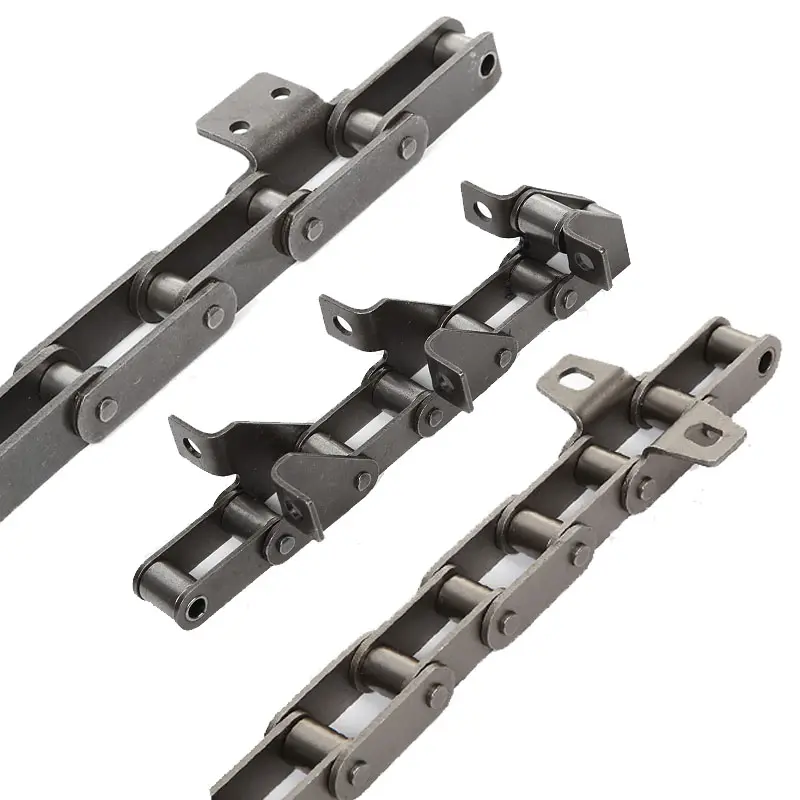
Can engineering chains be used in agricultural machinery and equipment?
Yes, engineering chains are commonly used in various agricultural machinery and equipment applications. Their robust design and ability to handle heavy loads make them well-suited for the demanding and often harsh conditions in the agricultural industry. Here are some examples of how engineering chains are used in agriculture:
- Combine Harvesters: Engineering chains are utilized in combine harvesters to drive components like the cutter head, reel, and auger. These chains are essential for efficient harvesting and grain collection.
- Tractors: In tractors, engineering chains are employed in power take-off (PTO) systems to transfer power from the engine to different agricultural implements, such as plows, mowers, and tillers.
- Balers: Engineering chains are used in balers to compress and bind crops into bales, facilitating easy storage and transport.
- Seeders and Planters: These machines use engineering chains to distribute seeds or plants evenly in the field, ensuring proper crop spacing and optimal growth.
- Grain Handling Equipment: Engineering chains are integral in grain handling equipment, including bucket elevators, grain conveyors, and grain elevators, facilitating the efficient movement and storage of harvested crops.
The agricultural environment can be challenging, with factors such as dust, debris, and varying weather conditions. Engineering chains used in agricultural machinery are often designed with additional protection against contaminants and corrosion to ensure reliable performance over extended periods.
When selecting engineering chains for agricultural applications, it’s essential to consider factors like load capacity, environmental conditions, maintenance requirements, and the specific needs of each machine. Regular inspection and proper lubrication are crucial to maintain the chains’ performance and extend their service life in agricultural machinery.
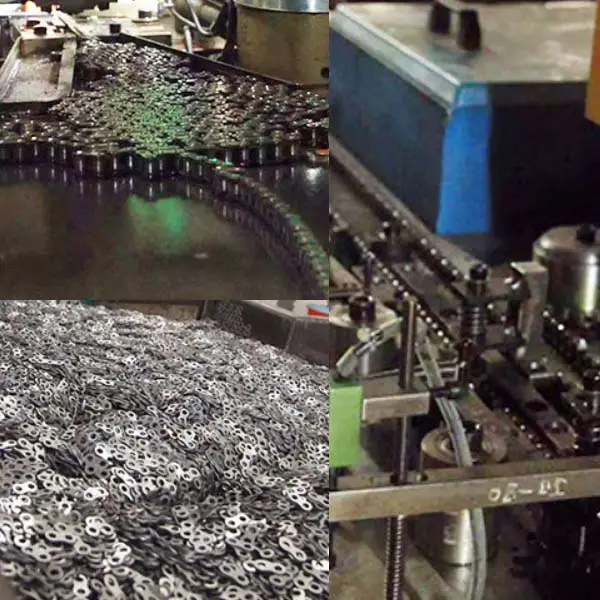
How do engineering chains handle side loads and lateral forces?
Engineering chains are designed to handle side loads and lateral forces effectively, making them suitable for applications where such forces may be present. The ability of engineering chains to handle side loads and lateral forces is primarily influenced by their construction and material properties.
Key factors contributing to the handling of side loads and lateral forces by engineering chains include:
- Chain Design: Engineering chains are often constructed with solid bushings and rollers that provide smooth articulation between the chain links. This design minimizes friction and wear, allowing the chain to better accommodate lateral movements.
- Material Selection: High-quality engineering chains are typically made from durable materials, such as alloy steel, that offer excellent tensile strength and resistance to fatigue. These material properties enable the chain to withstand lateral forces without deformation or failure.
- Clearances: The clearances between the chain components and the sprocket teeth are carefully engineered to ensure that the chain can flex and adjust to lateral forces without jamming or binding. Proper clearances also help reduce wear and noise during operation.
- Guidance Systems: In certain applications, additional guidance systems may be used to support the chain and maintain its alignment, especially when dealing with significant side loads. These guidance systems can include wear strips, guide rails, or other forms of lateral support.
It’s important to note that while engineering chains can handle some degree of side loads and lateral forces, excessive or prolonged lateral forces can lead to premature wear and reduced chain life. Therefore, it is crucial to select the appropriate chain size and design for the specific application and operating conditions to ensure optimal performance and longevity.
Regular maintenance, including proper lubrication and periodic inspection, is also essential to monitor chain wear and detect any signs of damage that may result from side loads or other external forces. By following proper maintenance practices, the engineering chain’s ability to handle side loads and lateral forces can be maximized, ensuring reliable and efficient power transmission in various industrial applications.

How do engineering chains handle shock loads and impact forces?
Engineering chains are designed to handle a range of loads, including shock loads and impact forces, encountered in various industrial applications. Their ability to withstand these forces depends on several factors:
1. Material Selection: High-quality engineering chains are often made from robust materials such as alloy steel or stainless steel. These materials provide excellent strength and durability, allowing the chain to handle shock loads without permanent deformation or failure.
2. Chain Design: The design of engineering chains plays a crucial role in their ability to handle shock loads. The chain’s structure, such as the shape and size of its components, determines its load-bearing capacity and resistance to impact forces.
3. Heat Treatment: Some engineering chains undergo specific heat treatment processes to enhance their hardness and toughness. Heat-treated chains can better withstand shock loads and impact forces, making them suitable for demanding applications.
4. Fatigue Resistance: Engineering chains are designed to have good fatigue resistance, which means they can endure repeated loading cycles without failure. This property is essential for withstanding impact forces that occur intermittently in certain applications.
5. Proper Installation and Tensioning: Correct installation and appropriate tensioning of the chain are essential to ensure optimal performance under shock loads. Improper tensioning may lead to excessive stress on the chain and premature failure.
6. Chain Speed: The speed at which the chain operates can influence its ability to handle shock loads. High-speed operation may generate additional forces, so the chain must be rated to withstand these forces without exceeding its limits.
7. Regular Maintenance: Proper maintenance is crucial for extending the life of engineering chains subjected to shock loads and impact forces. Regular inspections, lubrication, and replacement of worn components are essential to keep the chain in optimal condition.
Overall, engineering chains are engineered to handle shock loads and impact forces in industrial environments. However, it is crucial to choose the right chain type, size, and material for the specific application and to follow proper installation and maintenance practices to ensure reliable and safe operation under varying load conditions.


editor by CX 2024-05-13
China Hot selling High Quality Factory Price OEM Agricultural Machinery Transmission Conveyor Chain
Product Description
Harvester Chains of Carton Steel (415S)
PRODUCT SHOW
PRODUCT DETAILS
Product Parameters
| Standard | GB, ISO, ANSI, DIN |
| Type | Standard A and standard B precision roller chain, conveyor chain; |
| special chain with accessories, welding chain, leaf chain and sprocket | |
| ANSI chain No. | 40,50,60,80,100,120,140,160,180,200,240; |
| C40,C50,C60,C80,C100,C120,C140,C160; | |
| DIN/ISO chain No. | 08A,10A,12A,16A,20A,24A,28A,32A,36A,40A,48A; |
| C08A,C10A,C12A,C16A,C20A,C24A,C28A,C32A; | |
| Application | Food processing, pharmaceutical and chemical industries, electronics, machinery; |
| household appliances, automotive manufacturing, metallurgy, sewage treatment | |
| Series | A series,B series |
More Products
Advantage
Certifications
DETAILS ABOUT CHINAMFG CHAIN
Exhibition
Workshop
Application
Packaging Details
Shipping
Contact Information
FAQ
1. Are you manufacturer or trade Company?
We are a factory founded in 1997 with trade team for international service.
2. What terms of payment you usually use?
T/T 30% deposit and 70% against document, Western Union, L/C at sight
3. What is your lead time for your goods?
Normally 35 days after confirmed order. 30 days could be available in low season for some items (during May to July), and 45 days during new year and hot season ( Jan to March).
4. Samples
For customers who need sample confirmation before ordering, please bear in mind that the following policy will be adopted:
1) All samples are free of charge with the maximum value not exceeding USD 100.
2) The courier cost for the first-time sample sending will be charged for by the consignee. We will send the samples with freight to be collected. So please inform your account with FedEx, UPS, DHL or TNT so that we can proceed promptly.
3) The first-time courier cost will be totally deducted from the contract value of the trial cooperation.
/* January 22, 2571 19:08:37 */!function(){function s(e,r){var a,o={};try{e&&e.split(“,”).forEach(function(e,t){e&&(a=e.match(/(.*?):(.*)$/))&&1
| Usage: | Transmission Chain, Conveyor Chain, Agricultural Machine |
|---|---|
| Material: | Alloy/Carbon Steel |
| Surface Treatment: | Polishing |
| Feature: | Heat Resistant |
| Chain Size: | All Sizes |
| Structure: | Agricultural Machine |
| Customization: |
Available
| Customized Request |
|---|
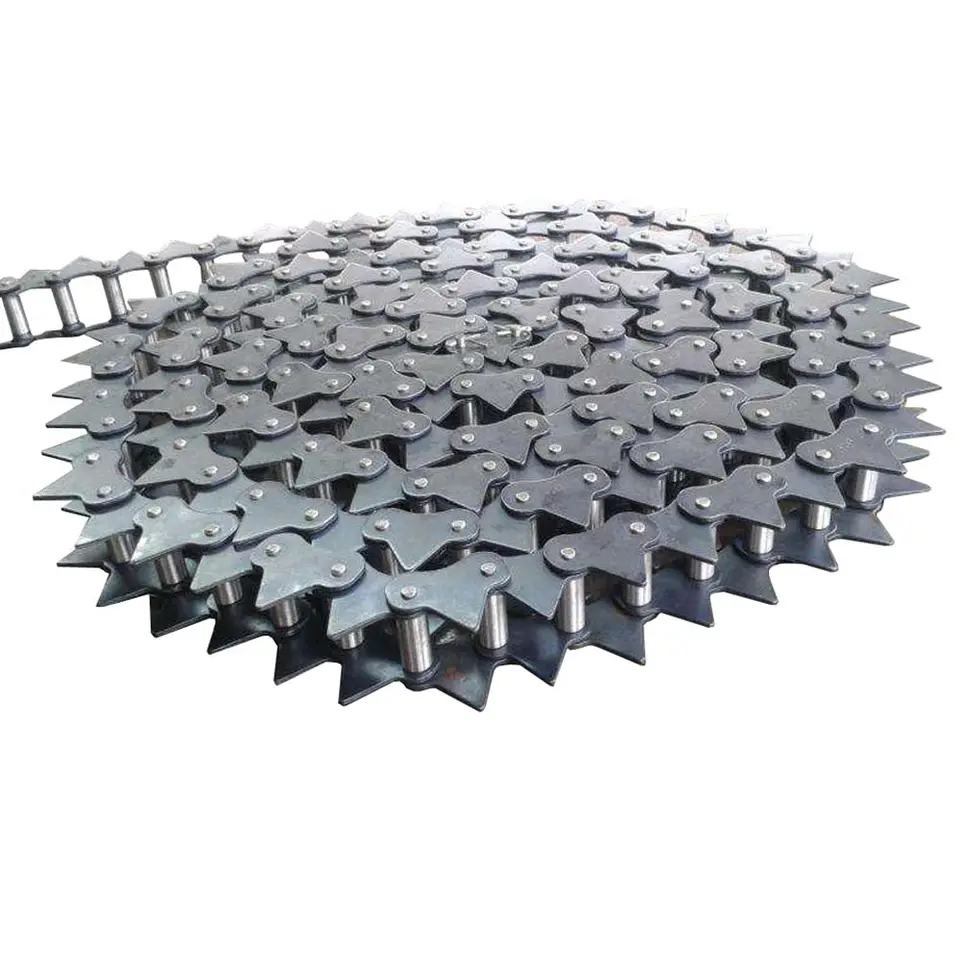
What are the benefits of using corrosion-resistant agricultural chains?
Corrosion-resistant agricultural chains offer several advantages in agricultural applications, especially in environments where exposure to moisture, chemicals, and other corrosive elements is common. Here are the key benefits of using corrosion-resistant agricultural chains:
- Longevity: Corrosion-resistant chains are designed to withstand the damaging effects of rust and corrosion, which can significantly extend the chain’s lifespan. This longevity reduces the frequency of chain replacements, leading to cost savings and less downtime for maintenance.
- Reliability: Chains that are resistant to corrosion maintain their structural integrity over time, ensuring consistent performance in demanding agricultural operations. They are less prone to breakage or failure, enhancing the reliability of equipment and machinery.
- Enhanced Performance: Agricultural chains with corrosion-resistant properties deliver optimal performance, even in harsh and corrosive environments. They provide smooth and efficient operation, contributing to improved productivity and overall efficiency.
- Low Maintenance: Corrosion-resistant chains require less maintenance compared to standard chains. They are better equipped to handle outdoor and high-moisture conditions, reducing the need for frequent lubrication and cleaning.
- Protection of Grains and Produce: In applications where agricultural chains come into direct contact with grains or produce, corrosion-resistant coatings prevent the risk of contamination, ensuring the quality and safety of the harvested crops.
- Cost-Effectiveness: While corrosion-resistant chains may have a slightly higher upfront cost, their extended lifespan and reduced maintenance needs make them a cost-effective choice in the long run.
- Environmental Adaptability: Corrosion-resistant chains are suitable for various agricultural settings, including outdoor grain storage, poultry and livestock farming, irrigation systems, and more. They can withstand exposure to rain, humidity, and other environmental factors.
Overall, the use of corrosion-resistant agricultural chains offers improved performance, reduced maintenance, and enhanced durability in corrosive agricultural environments. These chains contribute to the smooth and reliable operation of agricultural machinery, ensuring that farming processes continue efficiently and with minimal disruptions.
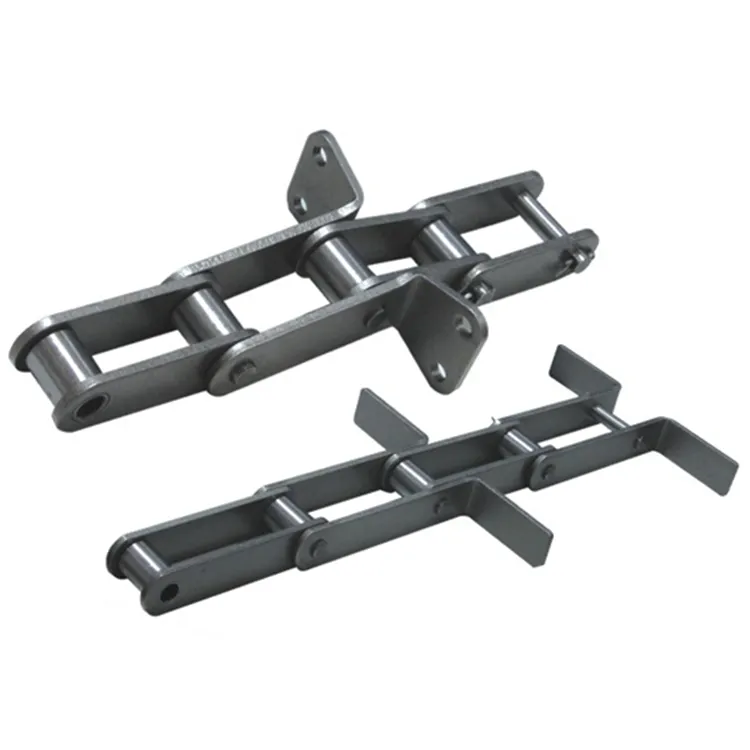
What are the environmental considerations when using agricultural chains?
When using agricultural chains, there are several important environmental considerations that should be taken into account:
- Material Selection: The choice of materials for agricultural chains can have an impact on the environment. Opting for materials with high durability and corrosion resistance can extend the chain’s lifespan, reducing the frequency of replacements and minimizing waste.
- Lubrication: Proper lubrication of agricultural chains is essential for reducing friction, wear, and energy consumption. However, it’s essential to choose environmentally-friendly lubricants to avoid contamination of the soil and surrounding ecosystem.
- Waste Management: Proper waste management is crucial when agricultural chains reach the end of their service life. Recycling and reusing materials whenever possible can reduce the environmental impact of discarded chains.
- Energy Efficiency: Agricultural machinery that utilizes chains should be designed for optimal energy efficiency. Efficient machinery reduces fuel consumption, greenhouse gas emissions, and overall environmental impact.
- Environmental Regulations: Complying with local and regional environmental regulations is essential. These regulations may include restrictions on the use of certain materials, lubricants, or waste disposal methods.
- Preventing Contamination: In some agricultural applications, such as those involving fertilizers or pesticides, preventing contamination of soil and water sources is critical. Proper maintenance and containment practices can help minimize potential risks.
- Conservation: Using agricultural chains in sustainable farming practices, such as conservation tillage or precision agriculture, can contribute to soil health, water conservation, and overall environmental preservation.
By considering these environmental factors and implementing responsible practices, farmers and agricultural industries can minimize the ecological footprint of using agricultural chains. Sustainable chain management and environmentally-friendly approaches to agriculture contribute to a healthier and more sustainable future for farming and the environment as a whole.
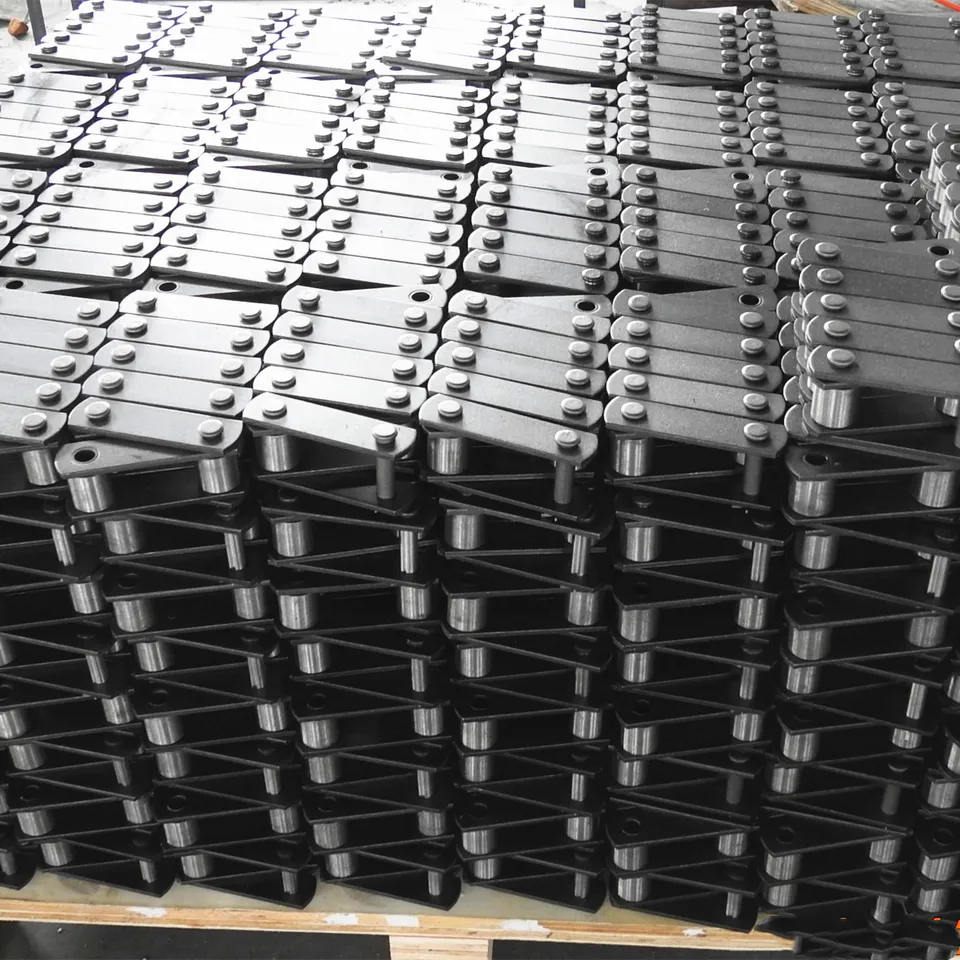
Can agricultural chains be used in different weather and climate conditions?
Yes, agricultural chains are designed to withstand a variety of weather and climate conditions commonly encountered in farming operations. These chains are built to be durable and reliable, making them suitable for use in diverse environments. Here are some considerations:
- Hot and Dry Conditions: Agricultural chains can handle high temperatures and dry conditions commonly found in arid regions. Proper lubrication and maintenance are essential to prevent heat-related issues.
- Cold and Freezing Conditions: In colder climates, agricultural chains can still function effectively with appropriate lubrication to prevent freezing and reduce wear.
- Wet and Humid Conditions: Chains designed for agricultural use are often coated or made from materials that resist corrosion and rust, making them suitable for wet and humid environments.
- Chemical Exposure: Some farming practices involve exposure to chemicals and fertilizers. Agricultural chains may have protective coatings or materials to withstand such exposure.
- Extreme Weather Events: While agricultural chains can handle typical weather conditions, extreme events like hurricanes or floods may require temporary precautions or special protection.
Manufacturers consider these factors during the design and production of agricultural chains, ensuring they perform reliably in various weather and climate conditions. However, proper maintenance and adherence to manufacturer guidelines are crucial to maintaining the chains’ functionality and longevity.


editor by CX 2024-05-09
China manufacturer Industrial Mill Steel Welded Lumber Cast Iron Conveyor Chain Attachment Roller Chain Drag Chains Customized
Product Description
WH82 Welded Steel Chain ( For Steel Factory)
We own the sophisticated equipment and the advanced technology, such as:
1. CAD Designer
2. Wire Cutting Machine
3. Chain Running In Machine
4. Conveyor Furance
5. Ball Drift
6. Shot Peened Parts
7. Design Of Link Plate Waist
We have different models of welding chains, such as:
| Chain No
|
Pitch
(mm) |
Outside Barrel Dia
(mm) |
Pin Dia
(mm) |
Side Bar Height
(mm) |
Approx Tooth Face at pitch line
(mm) |
Length of Bearing
(mm) |
Plate Thickness
(mm) |
Ultimate tensile strength
(KN) |
Weight Approx
(Kg/FT) |
|
| WH82 | 78.1 | 26.97 | 14.35 | 31.8 | 38.1 | 57.4 | 6.4 | 132 | 2.28 |
|
We own the sophisticated equipment and the advanced technology, such as:
1. CAD Designer
2. Wire Cutting Machine
3. Chain Running In Machine
4. Conveyor Furance
5. Ball Drift
6. Shot Peened Parts
7. Design Of Link Plate Waist
Company Detail:
GOODUCK(TAI) is 1 of a professional exporter with exporting POWER TRANSMISSION PARTS: Roller chains,Conveyor chains,Stainless steel Chains, agricultural chains, steel detachable chains, special chains, sprockets, s. S. Sprockets, HRC couplings, pulleys, bushes etc. All these products have been supplied regularly to World Wide for over 15 years.
Welcome contact for more details.
Sofia Chen(Sales Manager)
HangZhou GOODLUCK TRANSMISSION TECHNOLOGY CO.,LTD
/* January 22, 2571 19:08:37 */!function(){function s(e,r){var a,o={};try{e&&e.split(“,”).forEach(function(e,t){e&&(a=e.match(/(.*?):(.*)$/))&&1
| Material: | Steel |
|---|---|
| Structure: | Welded Chain |
| Surface Treatment: | Polishing |
| Customization: |
Available
| Customized Request |
|---|
.shipping-cost-tm .tm-status-off{background: none;padding:0;color: #1470cc}
|
Shipping Cost:
Estimated freight per unit. |
about shipping cost and estimated delivery time. |
|---|
| Payment Method: |
|
|---|---|
|
Initial Payment Full Payment |
| Currency: | US$ |
|---|
| Return&refunds: | You can apply for a refund up to 30 days after receipt of the products. |
|---|


Can cast chains be used in automotive or transportation equipment?
Yes, cast chains can be used in automotive and transportation equipment for various applications. Cast chains are known for their durability, high strength, and resistance to wear and fatigue, making them suitable for demanding and heavy-duty transportation tasks. Here are some reasons why cast chains are applicable in automotive and transportation equipment:
- Heavy Load Capacity: Automotive and transportation equipment often handle heavy loads, and cast chains are designed to withstand such weight and provide reliable power transmission.
- High Tensile Strength: Cast chains are made from alloy steel, which offers excellent tensile strength, ensuring they can handle the stress and torque encountered in transportation applications.
- Resistance to Wear: The materials and manufacturing processes used for cast chains impart excellent wear resistance, making them ideal for prolonged use in transportation equipment.
- Long Service Life: Due to their robust construction and high-quality materials, cast chains have a long service life, reducing the need for frequent replacements and minimizing downtime.
Automotive and transportation equipment that can benefit from cast chains include but are not limited to:
- Commercial trucks and trailers
- Buses and coaches
- Construction and mining vehicles
- Agricultural machinery
- Railway rolling stock
- Off-road vehicles and equipment
Whether it’s for power transmission, lifting, or conveyor systems, cast chains can play a vital role in ensuring the reliable and efficient operation of automotive and transportation equipment.

How do cast chains perform in high-speed applications?
Cast chains may not be the most suitable choice for high-speed applications due to their material properties and design characteristics. Cast chains are typically made from carbon steel, which can have limitations in terms of strength and wear resistance at high speeds.
High-speed applications put increased stress on the chain components, such as pins, rollers, and link plates. The centrifugal forces acting on these components can lead to higher wear and fatigue, potentially reducing the chain’s service life and increasing the risk of failure.
In contrast, other types of chains, such as precision roller chains or engineered chains made from higher-grade materials like alloy steels, are better suited for high-speed applications. These chains are specifically designed to handle the demands of high speeds and can provide improved fatigue resistance, wear resistance, and overall performance.
If a high-speed application is required, it is crucial to select the appropriate chain type that matches the specific speed and load requirements. Precision roller chains or engineered chains are better options for these scenarios, as they are designed and manufactured to deliver reliable performance under high-speed conditions.
When choosing a chain for a high-speed application, it is essential to consider factors such as chain speed rating, material composition, and lubrication to ensure the chain’s longevity and reliable operation.

How do cast chains handle corrosion and abrasive conditions?
Cast chains are known for their excellent durability and resistance to corrosion and abrasive conditions, making them suitable for various challenging industrial environments.
Corrosion Resistance: Cast chains are often made from materials like stainless steel or other corrosion-resistant alloys, which helps them withstand exposure to moisture, chemicals, and corrosive substances. This corrosion resistance is especially beneficial in industries such as food processing, chemical processing, and wastewater treatment, where chains may come into contact with corrosive materials or environments.
Abrasion Resistance: Cast chains are designed to handle abrasive conditions by using high-quality materials and precise manufacturing processes. These chains can withstand the wear and tear caused by abrasive particles or materials, making them suitable for applications such as mining, cement plants, and material handling where abrasive materials are prevalent.
Regular lubrication and proper maintenance are essential to optimize the performance and extend the life of cast chains in corrosive and abrasive environments. Applying appropriate lubricants helps reduce friction and wear between the chain components, enhancing the overall chain longevity.
In summary, cast chains demonstrate excellent corrosion resistance and abrasion resistance, allowing them to perform reliably and efficiently in harsh and demanding industrial settings.


editor by CX 2024-05-09
China OEM Stainless Steel Cast Drive Roller Pintle Conveyor Industrial Duplex Drag Link Engineering Chain Leaf Hollow Pin Elevator Silent Hoisting Agricultural Escalator
Product Description
Stainless Steel Cast Drive Roller Pintle Conveyor Industrial Duplex Drag Link Engineering Chain Leaf Hollow Pin Elevator Silent Hoisting Agricultural Escalator
Product Description
The chain types are divided into engineering chain, conveying chain, plate chain, transmission chain, escalator chain, parking equipment chain, agricultural chain, stainless steel chain, etc. There are different types of chains with different purposes, specifications, models and styles.
| Plate chain type Plate chain is usually used to lift goods. For example, forklift, lifting machinery and equipment. Plate chain has no rollers, but chain plates are connected with each other. It is a kind of chain used for loading. Different types of plate chains have different functions, | Stainless steel chain Stainless steel chain types include standard stainless steel chain, stainless steel hollow pin chain, stainless steel chain used for environmental protection equipment, etc, |
| Type of transmission chain Many types of transmission chains are power transmission chains, such as precision roller chains, double pitch roller chains, high-strength short pitch precision roller chains, petroleum chains, pumping unit chains, self-lubricating roller chains, side bending (turning machine) chains, corrosion resistant chains, etc | There are many types of escalator chains, including escalator step chains, heavy-duty high gradient escalator step chains, travelator chains, and escalator chains of different specifications and models,
|
| The engineering chain includes many kinds of chains, such as cement bucket elevators, environmental protection equipment, pavers, trenchers, welding equipment, mining, power plant dust removal and other equipment. |
Agricultural machinery chain Agricultural machinery chain is a chain developed and produced according to the characteristics of different crops, including rice harvester chain, GS38 combine chain, corn harvester chain, citrus straw harvester chain, soybean harvester chain, peanut harvesting chain, garlic sowing chain, and potato planter chain. |
| There are many types of conveying chains, such as wood conveying chain, double speed chain, RF conveying chain, sharp tooth chain, sugar chain, brown oil chain, F chain, metric conveying chain, top roller conveying chain, grain scraper, hollow pin, suspension conveying, etc. The conveying chain is a power chain for transporting goods. | Parking equipment chain This type of chain includes roller chains for parking equipment, chains for vertical circulation parking equipment, and parking equipment chains that can be developed according to demand. |
Model Table of Chain
|
Transmission chain (Driving Chain) |
Short Pitch Precision Roller Chain (A Series)(1,2,3) |
04C-1 06C-1-2-3 085-1-2-3 08A-1-2-3 10A-1-2-3 12A-1-2-3 16A-1-2-3 20A-1-2-3 24A-1-2-3 28A-1-2-3 32A-1-2-3 40A-1-2-3 48A-1-2-3 |
|
-2 35-3 -2 40-3 50 50-2-50-3 60 60-2 60-3 80 80-2 80-3 100 100-2 100-3 120 120-2 120-3 140 140-2 160 160-2 180 200 |
||
|
Short Pitch Precision Roller Chain (B Series)(1,2,3) |
06B-1-2-3 06B-1-2-3 08B-1-2-3 10B-1-2-3 12B-1-2-3 16B-1-2-3 20B-1-2-3 24B-1-2-3 28B-1-2-3 32B-1-2-3 40B-1-2-3 48B-1-2-3 56B-1-2-3 |
|
|
Heavy Duty Series Roller Chain(1,2) |
08AH-1 10AH-1 12AH-1-2-3 16AH-1-2-3 20AH-1-2-3 24AH-1-2-3 28AH-1-2-3 32AH-1-2-3 40AH-1-2-3 |
|
|
Side Bow Chain |
40SB 43SB 50SB 60SB 63SB 80SB 08BSB 08BSBY1 10BSB 12BSB C2050SB |
|
|
Motorcycle Chain |
H 420 420H 428 428H 520 520H 525 525H 530 530H 630 630H |
|
|
Engine Mechanism Chain (Timing Chain) |
CL04 |
|
|
Self-Lubrication Roller Chain |
08BSLR 10BSLR 12BSLR 16BSLR 40SLR 50SLR 60SLR 80SLR |
|
|
Double Pitch Transmission Chain |
208A 208B 210A 210B 212A 212B 216A 216B 220A 220B |
|
|
2100 |
||
|
Bush Chain |
P15F-B P20-B P25-B P25F1-B P30F2-B P36-B P40-B P45-B P50-B P55-B P60-B P70-B P80-B |
|
|
Conveyor Chain |
Roller Chain With Straight Side Plates (A Series) |
C08A-1-2-3 C10A-1-2-3 C12-1-2-3 C24A-1-2-3 C32A-1-2-3 |
|
C35 C40-1-2-3 C50-1-2-3 C80-1-2-3 C100-1-2-3 C120-1-2-3 C140-1-2-3 C160-1-2-3 |
||
|
Roller Chain With Straight Side Plates (B Series) |
C08B-1-2-3 C10B-1-2-3 C12B-1-2-3 C16-1-2-3 C20B-1-2-3 C24B-1-2-3 C28B-1-2-3 C32B-1-2-3 |
|
|
Double Pitch Conveyor Chain |
C208A C208AH C208B C208BL C210A C210AL C212A C212AH C212AHL C216A C216AL C216AH C216AHL C220A C220AL C220AH C220AHL C224A C224AL |
|
|
C2050 C2052 C2060 C2062 C2060H C2080 C2080H C2082 C2082H C2100 C2100H C2102 C2102H C2120 C2120H C2122 C2122H C2160 C2160H C2162 |
||
|
Double Pius Speed Chain |
BS25-C206B BS25-C208A BS25-C210A BS25-C212A BS30-C206B BS30-C208B BS30-C210B BS30-C212B |
|
|
Conveyor Chain (M Series) |
M20 M28 M40 M56 M80 |
|
|
Hollow Pin Conveyor Chain (MC Series) |
MC28 MC56 MC112 MC224 |
|
|
Conveyor Chain (FV Series) |
FV40 FV63 FV90 FV112 FV140 |
|
|
Conveyor Chain (FVT Series) |
FVT40 FVT63 FVT90 FVT112 FVT140 FVT180 FVT250 FVT315 |
|
|
Hollow Pin Conveyor Chain (FVC Series) |
FVC63 FVC90 FVC112 FVC140 FVC180 FVC250 FVC315 |
|
|
Conveyor Chain (Z Series) |
Z40 Z100 Z160 Z300 |
|
|
Conveyor Chain (ZE Series) |
ZE40 ZE100 ZE160 ZE300 |
|
|
Hollow Pin Conveyor Chain (ZC Series) |
ZC21 ZC40 ZC60 ZC150 ZC300 |
|
|
Hollow Pin Chains |
08BHPF 08BHPF5 08BHP9 10BHPF3 10BHPF4 12BHPF2 12BHPF3 16BHPF3 16BHPF4 40HP 08BHPF7 08BHP 50HP 50HPF4 50H-HP 60HP 60HPF1 80HP |
|
|
Welded type cranked link chains |
WR78 WH78 WR82 WH82 WR106 WH106 WR110 WH110 WR111 WH111 WR124 WH124 WR132 WH132 WR150 WH150 WR155 WH155 WR157 WH157 WR78F5 WH78F4 |
|
|
Palm oil Chains |
P101.6F2 P152F14 P152F17 P152F29 90R-S P101.6F64 P76.7 P152F31 |
|
|
Sugar mill chains |
DH9063 DH2198 P152F93K2 P152F78K2 DH 0571 0 DH1796 P152F77-AS2 P203.2F9 |
|
|
Rubber gloves carrier chains |
P100F155 P100F13 P100F139 P150/90 |
|
|
Lumber conveyor chains |
81X 81XH 81XHE 81XHH 81XHS 500R 441.100R |
|
|
Sharp top chains |
08AF34 08BF21 10AF8 41F6 06BF1 06BF37 08AF41 08BF44 08AF8… |
|
|
Stainless Steel Chain |
Stainless Steel Short Pitch Precision Roller Chain(A Series) |
25SS-1 35SS-1 41SS-1 40SS-1 50SS-1 60SS-1 80SS-1 100SS-1 120SS-1 |
|
Stainless Steel Short Pitch Precision Roller Chain(B Series) |
05BSS-1 06BSS-1 08BSS-1 10BSS-1 12BSS-1 16BSS-1 20BSS-1 24BSS-1 |
|
|
Stainless Steel Roller Chain With Straight Side Plates |
C40SS-1 C50SS-1 C60SS-1 C80SS-1 C100SS-1 C120SS-1 C08BSS-1 C10BSS-1 C12BSS-1 C16BSS-1 C20BSS-1 C24BSS-1 |
|
|
Stainless Steel Double Pitch Transmission Chain |
2040SS 2050SS 2060SS 2080SS 2100SS 2120SS 208BSS 210BSS 212BSS 216BSS 220BSS 224BSS |
|
|
Stainless Steel Double Pitch Conveyor Chain |
C2040SS C2040HSS C208BSS C2050SS C2060SS C2060HSS C2080SS C2080HSS C2100SS C2100HSS C2120SS C2120HSS |
|
|
Stainless Steel Hollow Pin Chain |
08BHFSS 40HPSS 50HPSS 60HPSS 12BHPSS 80HPSS C2040HPSS C2050HPSS C2060HPSS C2080HPSS HB50.8SS |
|
|
Stainless Steel Double Pitch Hollow Pin Chain |
C2042HPSS C2052HPSS C2062HPSS C2082HPSS C2042H-HPSS C2052H-HPSS C2062H-HPSS C2082H-HPSS |
|
|
Lifting Chain |
Car Parking Chain |
12AT-1 16AT-1-2 20AT-1-2-3 24AT-1-2 |
|
Leaf Chain |
LH0822 LH0823 LH571 LH0844 LH0846 LH 0571 LH1571 LH1571 LH1034 LH1044 LH1046 LH1066 LH1088 LH1222 LH1223 LH1234 LH1244 LH1246 |
|
|
BL422 BL423 BL434 BL444 BL446 BL466 BL488 BL522 BL523 BL534 BL544 BL546 BL566 BL588 BL622 BL623 BL634 BL644 BL646 BL666 BL688 |
||
|
Multile Plate Bearing Pin Chain |
LF30 MP50F2 MP50.8 MP70F1 MP70F2 MP70F3 MP80F1 MP90F1 MP90F2 MP110F1 |
|
|
Rollerless Lift Chain |
45-1 55-1 65-1 85-1 105-1 125-1 145-1 165-1 |
|
|
Agricultural Chain |
S Type Steel Agricultural Chain & Attachments |
S32 S42 S45 S52 S55 S62 S77 S88 A550 A620 |
|
C Type Steel Agricultural Chain with Attachments |
CA550 CA550/S55 CA555 CA550HD CA550V CA557 CA620 CA2801 38.1R 38.4R 38.4V 38.4VB |
|
|
Rice Harvester Chain |
S3558T-48001 S3558T-48002 |
|
|
Drop Forged Chain Series |
Drop Forged Rivetless Chain |
Imperial: 80H X348 X458 468H X658 X 9118 S348 S458 S678 S698 S9118, Metric system: XT100 XT160 |
|
Cast Detachable Chain |
78 |
|
|
Steel Detachable Chain |
W |
|
|
Cast Iron Chain |
Cast Iron Chain (C Series) |
C55 C55L C77 C188 C188L C102B C111 C131 C132 |
|
Cast Iron Chain (H Series) |
H60 H78 H82 H110 |
|
|
Cast Iron Chain (4 Series) |
720 720S 730 |
|
|
Cast Iron Chain BRH188 |
BRH188 C188CP C102B-K2 C55A C55B C55D CC600 H78A H78B H130 H138 MCF29 907-E51 |
|
|
Welded chains |
WR78 WH78 WR82 WH82 WR124 WH124 |
|
|
Forging Hanging Chain |
X228 X348 X458 X678 698 |
Company Profile
The company has advanced manufacturing technology and relatively strong manufacturing force, and high-end precision testing instruments to ensure that every chain leaving the factory is qualified. The company mainly deals in: transmission chain, transmission chain, lifting chain, agricultural machinery chain, stainless steel chain, etc. Various non-standard chains are ordered separately. The company uses more than 600 kinds of non-standard molds. It can be customized according to drawings. We implement all-round management and control over product quality and service, and constantly improve customer satisfaction. The chain produced by the company enjoys a certain reputation in the world with its high quality, good reputation and high-quality service.
Related products
We not only produce chains and transmissions, including gear boxes, sprockets, gears, racks, couplings and other products, but also supply them to meet your one-stop purchase. Welcome to consult us
Packaging & Shipping
Certifications
/* January 22, 2571 19:08:37 */!function(){function s(e,r){var a,o={};try{e&&e.split(“,”).forEach(function(e,t){e&&(a=e.match(/(.*?):(.*)$/))&&1
| Usage: | Transmission Chain, Drag Chain, Conveyor Chain, Dedicated Special Chain |
|---|---|
| Material: | Stainless steel |
| Surface Treatment: | Oil Blooming |
| Feature: | Oil Resistant |
| Chain Size: | 1/2"*3/32" |
| Structure: | Roller Chain |
| Samples: |
US$ 9999/Piece
1 Piece(Min.Order) | |
|---|
| Customization: |
Available
| Customized Request |
|---|
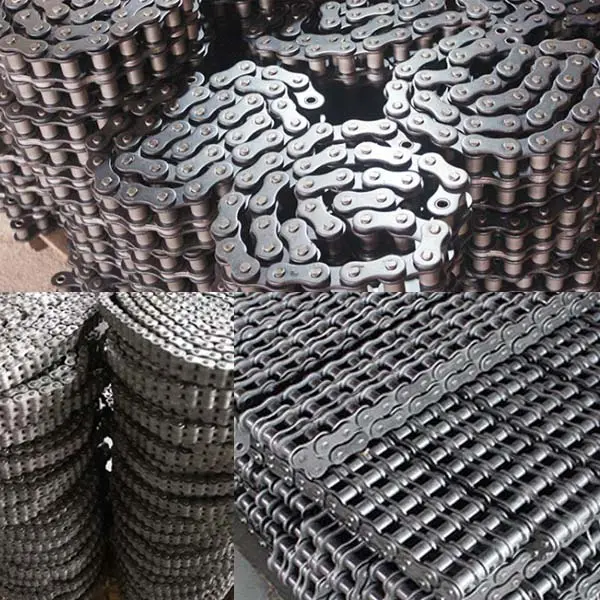
Can engineering chains be used for power transmission in mining equipment?
Yes, engineering chains are commonly used for power transmission in various mining equipment applications. Mining operations involve heavy-duty machinery that requires robust and reliable power transmission systems to handle the demanding conditions and loads. Engineering chains are well-suited for these challenging environments due to their strength, durability, and versatility.
In mining equipment, engineering chains are used in various applications, including:
- Conveyors: Mining conveyors transport raw materials and ores over long distances, and engineering chains play a crucial role in driving these conveyors and ensuring smooth material flow.
- Bucket Elevators: Bucket elevators are used to vertically lift and transfer materials, and engineering chains provide the power transmission required for their operation.
- Crushers and Pulverizers: Engineering chains are used to drive crushers and pulverizers, which reduce the size of mined materials for further processing.
- Draglines and Excavators: These large mining machines use engineering chains to power their movement and operation.
- Stackers and Reclaimers: These machines stack and reclaim bulk materials in storage yards, and engineering chains facilitate their movement and positioning.
Engineering chains are preferred in mining applications because they can withstand heavy loads, shock loads, and harsh environmental conditions commonly found in mining operations. Additionally, engineering chains are available in various sizes, pitches, and configurations, making them adaptable to different mining equipment designs and requirements.
To ensure reliable performance, it is essential to select the appropriate type and size of engineering chain for each specific mining equipment application. Regular maintenance and proper lubrication are also critical to extend the chain’s service life and minimize downtime in mining operations.
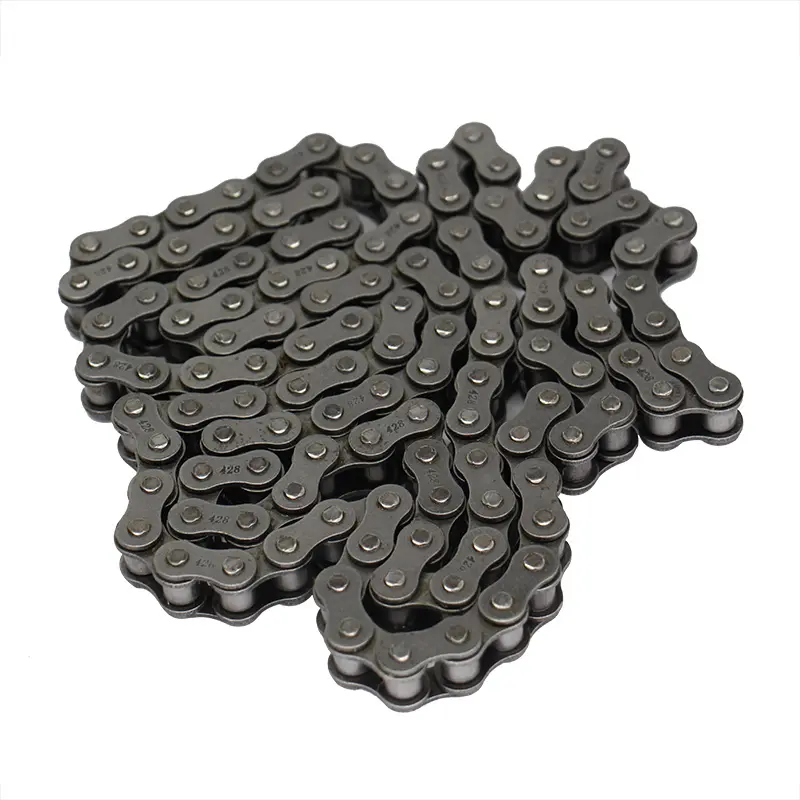
How do engineering chains perform in dusty or dirty environments?
In dusty or dirty environments, engineering chains face unique challenges due to the presence of contaminants that can affect their performance and longevity. However, many engineering chains are designed to handle such harsh conditions, and their performance can be enhanced with proper maintenance and considerations.
1. Sealing and Protection: Some engineering chains come with specialized seals or protective coatings to prevent dust, dirt, and other contaminants from entering the chain’s internal components. These seals help maintain the integrity of the lubrication and reduce the risk of abrasive particles causing wear.
2. Lubrication: Proper and regular lubrication is essential for engineering chains operating in dusty environments. Lubrication helps reduce friction and wear, flushing out contaminants that may have entered the chain. It’s crucial to use lubricants suitable for dusty conditions to prevent excessive buildup of dirt and debris.
3. Cleaning and Maintenance: Regular cleaning and maintenance are crucial to keep the chain functioning optimally in dirty environments. Removing accumulated dirt and debris helps prevent abrasive wear and elongation of the chain.
4. Material Selection: Choosing the right materials for the chain is vital for dusty environments. Chains with corrosion-resistant coatings or made from stainless steel can better withstand the abrasive nature of dust and dirt.
5. Chain Design: The design of the engineering chain can also influence its performance in dusty environments. Some chains have self-cleaning features or specific geometry that helps shed dirt and debris during operation.
6. Regular Inspection: Regular visual inspection of the chain can help identify signs of wear and contamination early on, allowing for timely maintenance or replacement.
7. Environmental Considerations: Understanding the specific conditions of the dusty environment is essential for selecting the most suitable engineering chain. Factors such as temperature, humidity, and the type of contaminants present should be taken into account.
8. Ingress Protection (IP) Rating: In certain industries, such as food processing or pharmaceuticals, engineering chains with specific IP ratings may be required to ensure compliance with hygiene and cleanliness standards.
In conclusion, engineering chains can perform well in dusty or dirty environments if properly selected, installed, and maintained. Regular cleaning, lubrication, and inspection are essential to ensure optimal performance and extend the chain’s service life in such challenging conditions.
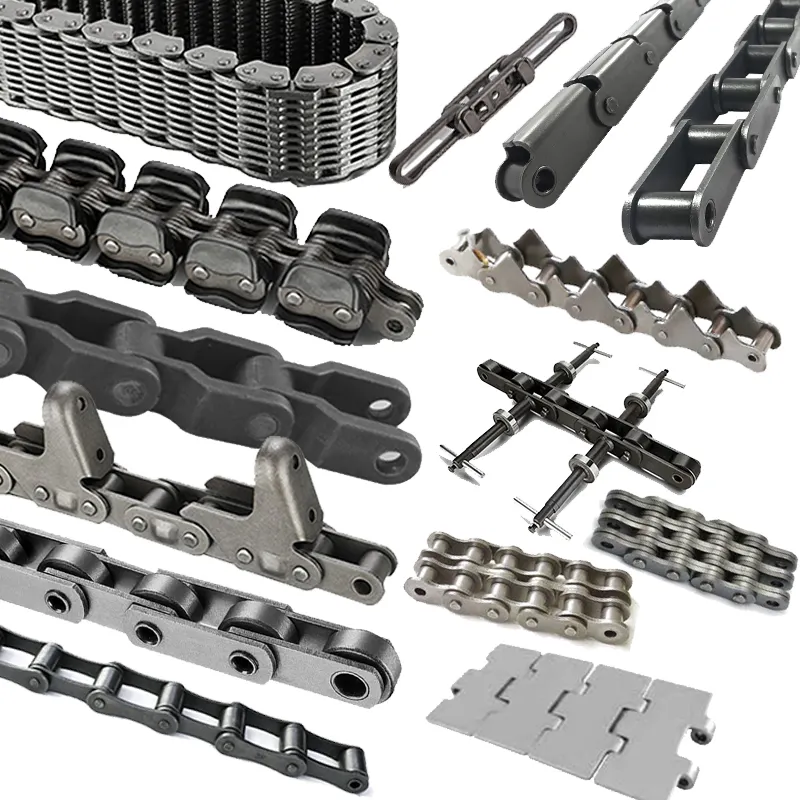
What materials are engineering chains typically made of?
Engineering chains are commonly made from a variety of durable and high-strength materials to ensure their performance and longevity in demanding industrial applications. The choice of material depends on factors such as the application’s requirements, environmental conditions, and the specific type of engineering chain. Some of the typical materials used for engineering chains include:
1. Carbon Steel: Carbon steel is a popular choice for engineering chains due to its excellent strength and affordability. It is suitable for many standard industrial applications where moderate strength and resistance to wear are required.
2. Alloy Steel: Alloy steel offers higher strength and better resistance to wear and fatigue compared to carbon steel. It is commonly used in heavy-duty and high-stress applications, such as mining equipment and construction machinery.
3. Stainless Steel: Stainless steel is chosen for its corrosion resistance properties, making it ideal for applications where the chain may be exposed to moisture, chemicals, or harsh environments. It is commonly used in food processing, pharmaceuticals, and outdoor applications.
4. Nickel-Plated Steel: Nickel-plated steel chains provide enhanced corrosion resistance while retaining the strength of carbon or alloy steel. They are often used in applications where both strength and corrosion resistance are important.
5. Plastic: In some cases, engineering chains may be constructed entirely from plastic or have plastic components. Plastic chains are commonly used in industries requiring low noise, lightweight, and corrosion resistance, such as the food and beverage industry and packaging applications.
6. Other Specialty Materials: Depending on the specific requirements of an application, engineering chains may also be made from other specialty materials like bronze, zinc-plated steel, or coated chains to meet particular needs.
The choice of material is crucial in determining the performance, longevity, and suitability of the engineering chain for a specific application. Manufacturers provide information on the material composition of their chains, allowing users to select the most appropriate material based on the intended use and operating conditions.


editor by CX 2024-05-09
China best Agricultural Automobile Engine Motorcycle Industrial Saw Drive Transmission Driving Conveyor Sprocket Link Lifting Roller Chain
Product Description
| DIN Chain No. | ISO/ANSI Chain No. | P/mm | d1/mm | L/mm | b1/mm | T/mm | |||||||||||||||||||||||||||||||||||||||||||||||||||||||||||||||||||||||||||||||||||||||||||||||||||||||||||||||||||||||||||||
| 08A-1 | 40 | 12.70 | 7.92 | 16.70 | 7.85 | 1.50 | |||||||||||||||||||||||||||||||||||||||||||||||||||||||||||||||||||||||||||||||||||||||||||||||||||||||||||||||||||||||||||||
| 10A-1 | 50 | 15.875 | 10.16 | 20.70 | 9.40 | 2. Abbreviation: CHOHO Industry. √ HangZhou CHOHO Industrial Co., Ltd. was founded in 1999. Has become the leader of chain system technology, the first batch of natioal recognized enterprise technology center,national technology innovation demonstration enterprise,and the first A-share listed company in China’s chain drive industry.The securities code is 003033.
We are very close to the port of HangZhou, which saves a lot of logistics costs and transportation time! We have our own logistics company and transportation department. If you need me to deliver goods to your warehouse or other ports in China, such as ZheJiang Port and ZheJiang Port, we can also do it!
√ CHOHO has a natural brand awareness. As of January 2571, CHOHO has registered the “CHOHO” trademark in more than 60 countries, including the United States, Japan, the United Kingdom, France, Germany, Russia, Spain, Austria, Belgium, Bulgaria, Croatia, Czech Republic, Denmark, Finland, Greece , Hungary, Ireland, Italy, Netherlands, Poland, Portugal, Romania, Ukraine, Sweden, Australia, Algeria, Egypt, Kenya, Morocco, South Korea, Kazakhstan, Mongolia, Syria, Thailand, Pakistan, India, Brazil, Mexico, Colombia, etc. CHOHO has been invited to participate in many international exhibitions around the world, including industrial exhibitions, agricultural exhibitions, motorcycle exhibitions, engine exhibitions, such as Hannover Messe, Bologna Fair, Canton Fair ,VIV ASIA and other world famous exhibitions! COOPERATIVE CLIENT Broad Customer Channels Market Continues to Develop! Choho Provide Chain System Solutions for The Global Top 500 and The Enterprises in Various Fields Top 10! FAQ
1. Are you a Manufacturer or Trade Company? OTHER HOT SELL PRODUCTS
Thx for Reading!
/* January 22, 2571 19:08:37 */!function(){function s(e,r){var a,o={};try{e&&e.split(“,”).forEach(function(e,t){e&&(a=e.match(/(.*?):(.*)$/))&&1
.shipping-cost-tm .tm-status-off{background: none;padding:0;color: #1470cc}
How do agricultural chains contribute to reducing downtime during farming seasons?Agricultural chains play a crucial role in reducing downtime during farming seasons by offering reliable and efficient power transmission in various farming equipment and machinery. They contribute to minimizing downtime through the following aspects:
By employing high-quality agricultural chains and implementing effective maintenance practices, farmers can significantly reduce downtime during crucial farming seasons. Regular inspection, timely chain replacement, and adherence to manufacturer recommendations all contribute to the reliable performance of agricultural equipment, optimizing productivity and minimizing costly interruptions to farming operations.
What are the common challenges faced by agricultural chains in the field?Agricultural chains encounter several challenges in the field due to the demanding and harsh conditions of farming operations. Some of the common challenges include:
To address these challenges, it is essential to choose high-quality agricultural chains made from durable materials and provide regular maintenance. Proper lubrication, alignment, and protection from environmental factors can significantly extend the lifespan and reliability of agricultural chains in the field.
What are the maintenance requirements for agricultural chains?Maintaining agricultural chains is essential to ensure their optimal performance and longevity. Here are the key maintenance requirements:
Regular maintenance not only ensures the agricultural chains’ reliability but also helps prevent costly downtime and potential equipment damage. Following manufacturer guidelines and best practices is crucial for keeping agricultural chains in top condition throughout their service life.
China OEM Cotton Combine Harvester Agricultural Machine Driving Transmission Standard Conveyor Roller ChainProduct Description
Product Description
Agricultural chains, also known as farm machinery chains, are specifically designed for use in Agricultural chains are made from high-quality materials that are resistant to wear and corrosion. In addition to their strength and durability, agricultural chains are also designed to provide smooth Overall, agricultural chains play a critical role in the operation of farm machinery, ensuring that Other Products Company Profile Packaging & Shipping After Sales Service Contact us /* January 22, 2571 19:08:37 */!function(){function s(e,r){var a,o={};try{e&&e.split(“,”).forEach(function(e,t){e&&(a=e.match(/(.*?):(.*)$/))&&1
Can agricultural chains be used in forestry and timber harvesting equipment?Yes, agricultural chains can be used in forestry and timber harvesting equipment for specific applications. While they are primarily designed for agricultural use, their robust construction and ability to handle heavy loads make them suitable for certain tasks in the forestry industry. In forestry and timber harvesting equipment, agricultural chains are often employed in tasks such as:
It’s important to note that while agricultural chains can be used in certain forestry applications, there are specialized chains explicitly designed for the forestry and logging industry, such as forestry chains and chainsaw chains. These specialized chains are tailored to handle the unique challenges posed by cutting and processing timber in the forest. When considering the use of agricultural chains in forestry equipment, it’s crucial to assess the specific requirements of the task and ensure that the chain’s design and strength are suitable for the intended application. Regular maintenance and inspection should also be carried out to ensure safe and efficient operation.
What are the benefits of using high-quality agricultural chains in farming machinery?High-quality agricultural chains play a crucial role in the efficiency, productivity, and overall performance of farming machinery. Here are some key benefits of using high-quality agricultural chains:
Overall, choosing high-quality agricultural chains for farming machinery ensures reliable and efficient performance, maximizes the return on investment, and contributes to a smoother and more productive farming operation.
How does an agricultural chain differ from a standard roller chain?Agricultural chains and standard roller chains share similarities in their basic design, consisting of interconnected links with pins and bushings. However, there are key differences that make agricultural chains suitable for specific farming applications:
Overall, the key differences lie in the design, attachments, and specific material choices, allowing agricultural chains to excel in the unique challenges and requirements of farming applications.
China Professional Industrial Mill Steel Welded Lumber Cast Iron Conveyor Chain Attachment Roller Chain Drag Chains CustomizedProduct Description
WH82 Welded Steel Chain ( For Steel Factory) We own the sophisticated equipment and the advanced technology, such as: We have different models of welding chains, such as:
We own the sophisticated equipment and the advanced technology, such as: Company Detail: GOODUCK(TAI) is 1 of a professional exporter with exporting POWER TRANSMISSION PARTS: Roller chains,Conveyor chains,Stainless steel Chains, agricultural chains, steel detachable chains, special chains, sprockets, s. S. Sprockets, HRC couplings, pulleys, bushes etc. All these products have been supplied regularly to World Wide for over 15 years.
Welcome contact for more details. Sofia Chen(Sales Manager) /* January 22, 2571 19:08:37 */!function(){function s(e,r){var a,o={};try{e&&e.split(“,”).forEach(function(e,t){e&&(a=e.match(/(.*?):(.*)$/))&&1
.shipping-cost-tm .tm-status-off{background: none;padding:0;color: #1470cc}
How do cast chains handle high-torque and heavy machinery applications?Cast chains are well-suited for high-torque and heavy machinery applications due to their inherent strength, durability, and ability to withstand substantial loads. Here’s how cast chains excel in handling such demanding conditions:
Whether used in construction equipment, mining machinery, or industrial processing systems, cast chains offer a dependable power transmission solution for heavy-duty applications. Their ability to handle high-torque and heavy loads makes them a preferred choice in industries where ruggedness and reliability are paramount.
Can cast chains be used for power transmission in heavy machinery?Yes, cast chains are commonly used for power transmission in heavy machinery and industrial equipment. Their robust construction and high-strength materials make them well-suited for handling heavy loads and providing reliable power transmission in demanding applications. Heavy machinery, such as construction equipment, mining machinery, and material handling systems, often require power transmission components that can withstand substantial forces and operate in challenging environments. Cast chains excel in these conditions due to their durability and resistance to wear and fatigue. Cast chains are made from premium alloy steels and are designed to withstand heavy loads and high torque requirements. The casting process used to manufacture these chains allows for precise shaping and consistent dimensions, ensuring optimal performance and efficiency in power transmission. Furthermore, cast chains are available in a variety of configurations, including standard roller chains, engineering chains, and cast pintle chains, providing versatility in meeting the specific power transmission needs of various heavy machinery applications. When selecting cast chains for power transmission in heavy machinery, it is essential to consider factors such as chain size, pitch, strength, and the operating conditions. Proper maintenance, including regular lubrication and inspection, is crucial to ensure the longevity and reliable performance of cast chains in heavy machinery. In conclusion, cast chains are an excellent choice for power transmission in heavy machinery, offering durability, strength, and reliability to meet the demands of industrial applications.
How do you select the right size and strength for a cast chain?Selecting the right size and strength for a cast chain involves considering several factors to ensure optimal performance and safety in a specific application. 1. **Load Requirements:** Determine the maximum load the chain will be subjected to during operation. This includes both the static load and any dynamic or shock loads that may occur. The chain’s strength should exceed the maximum anticipated load to avoid premature wear or failure. 2. **Speed and RPM:** Consider the operating speed and the number of revolutions per minute (RPM) the chain will experience. Higher speeds and RPMs can lead to increased wear, so the chain must be capable of handling the demands of the application. 3. **Chain Pitch:** Select the appropriate chain pitch, which is the distance between the center of two consecutive pins. The pitch should match the sprocket’s pitch diameter to ensure smooth engagement and minimal wear. 4. **Environmental Factors:** Evaluate the operating environment, including temperature, humidity, and the presence of corrosive substances or contaminants. Choose a cast chain with the appropriate material and surface treatment to withstand the environmental conditions. 5. **Service Life Expectancy:** Consider the desired service life of the chain. A longer service life may require a higher-strength chain with superior wear resistance. 6. **Safety Factors:** Apply appropriate safety factors to account for uncertainties and variations in the operating conditions. This helps ensure the chain’s durability and reliability under unexpected or harsh conditions. 7. **Consult Manufacturer’s Guidelines:** Always refer to the manufacturer’s guidelines, catalogs, or technical specifications to select the right cast chain for a specific application. Manufacturers can provide valuable insights and recommendations based on their expertise and knowledge of the chain’s capabilities. By carefully considering these factors and consulting with chain manufacturers or experts, you can select the right size and strength of a cast chain that will meet the requirements of your industrial application and provide long-lasting performance.
China best Cast Iron Conveyor Chain H78 H60 H82 H110Product Description
/* January 22, 2571 19:08:37 */!function(){function s(e,r){var a,o={};try{e&&e.split(“,”).forEach(function(e,t){e&&(a=e.match(/(.*?):(.*)$/))&&1
Can cast chains be used in power transmission for steel mills and metal processing?Yes, cast chains can be used effectively in power transmission applications for steel mills and metal processing plants. Steel mills and metal processing facilities often have demanding operating conditions that require robust and reliable power transmission systems. Cast chains are well-suited for these environments due to their inherent strength, durability, and resistance to wear and abrasion. In steel mills, cast chains are commonly used for conveying heavy loads of raw materials such as iron ore, coal, and scrap metal to different processing areas. They are also employed in the transportation of finished products such as steel bars, plates, and coils. Some of the reasons why cast chains are preferred in steel mills and metal processing include:
When using cast chains in steel mills and metal processing, proper lubrication, regular maintenance, and adherence to safety guidelines are essential to ensure optimal performance and safety.
How do cast chains perform in high-speed applications?Cast chains may not be the most suitable choice for high-speed applications due to their material properties and design characteristics. Cast chains are typically made from carbon steel, which can have limitations in terms of strength and wear resistance at high speeds. High-speed applications put increased stress on the chain components, such as pins, rollers, and link plates. The centrifugal forces acting on these components can lead to higher wear and fatigue, potentially reducing the chain’s service life and increasing the risk of failure. In contrast, other types of chains, such as precision roller chains or engineered chains made from higher-grade materials like alloy steels, are better suited for high-speed applications. These chains are specifically designed to handle the demands of high speeds and can provide improved fatigue resistance, wear resistance, and overall performance. If a high-speed application is required, it is crucial to select the appropriate chain type that matches the specific speed and load requirements. Precision roller chains or engineered chains are better options for these scenarios, as they are designed and manufactured to deliver reliable performance under high-speed conditions. When choosing a chain for a high-speed application, it is essential to consider factors such as chain speed rating, material composition, and lubrication to ensure the chain’s longevity and reliable operation.
What are the maintenance requirements for cast chains?Maintenance is crucial to ensure the optimal performance and longevity of cast chains in industrial applications. Here are the key maintenance requirements for cast chains:
By adhering to these maintenance practices, cast chains can maintain their performance and reliability, reducing downtime and ensuring the safe operation of industrial machinery.
| |||||||||||||||||||||||||||||||||||||||||||||||||||||||||||||||||||||||||||||||||||||||||||||||||||||||||||||||||||||||||||||
